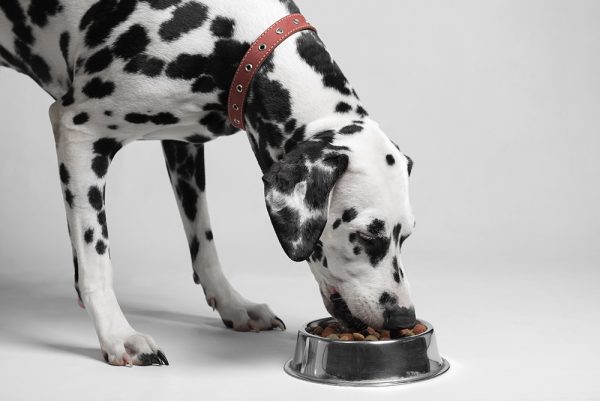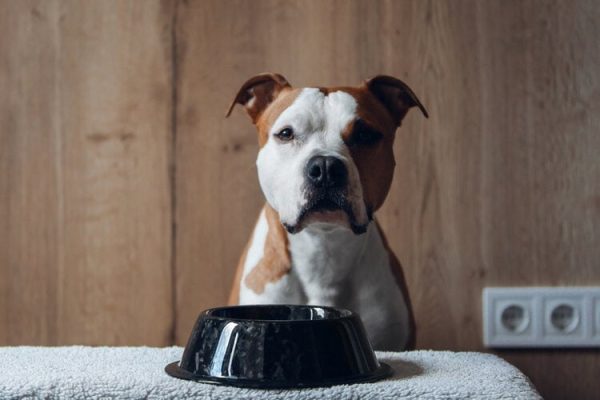In this article
View 5 More +For every dog that loves hanging their head out the car window and feeling the breeze in their hair, there’s another that would prefer to bury their head and forget they’re cruising down the road at high speeds. Many dogs get uncomfortable whenever they have to take a trip and experience an issue that many owners understand all too well: car sickness.
Car sickness can turn an average ride into a severe stressor for dogs, eventually making them resistant to getting into the vehicle at all, and it isn’t a problem that you can easily ignore. Vet visits, grooming appointments, and doggy daycare trips are unavoidable, as is your dog’s discomfort if you don’t resolve the issue.
The good news is that you can help your dog by figuring out the cause of their aversion to being in the car and learning what you can do to make your pet happy and comfortable while on the move.

What Is Car Sickness?
What we refer to as car sickness is when dogs feel nauseated when they are in a car. Generally, motion sickness can occur in any vehicle, whether a car, boat, or plane. The environment is highly stimulating and often overwhelming, especially for pets that only ride in the car a few times throughout the year.
Dogs can suffer issues like vomiting or diarrhea or may just experience intense nausea. Car sickness is most common in puppies due to the physiological factors that cause an upset stomach and their inexperience in the car.
But fear-based associations with riding in the car can also lead to anxiety and subsequent sickness in healthy, mature dogs, or conversely, their feelings of nausea can lead to stress and anxiety when traveling. Once they become accustomed to riding in vehicles, dogs can resolve the issue as they reach adulthood.
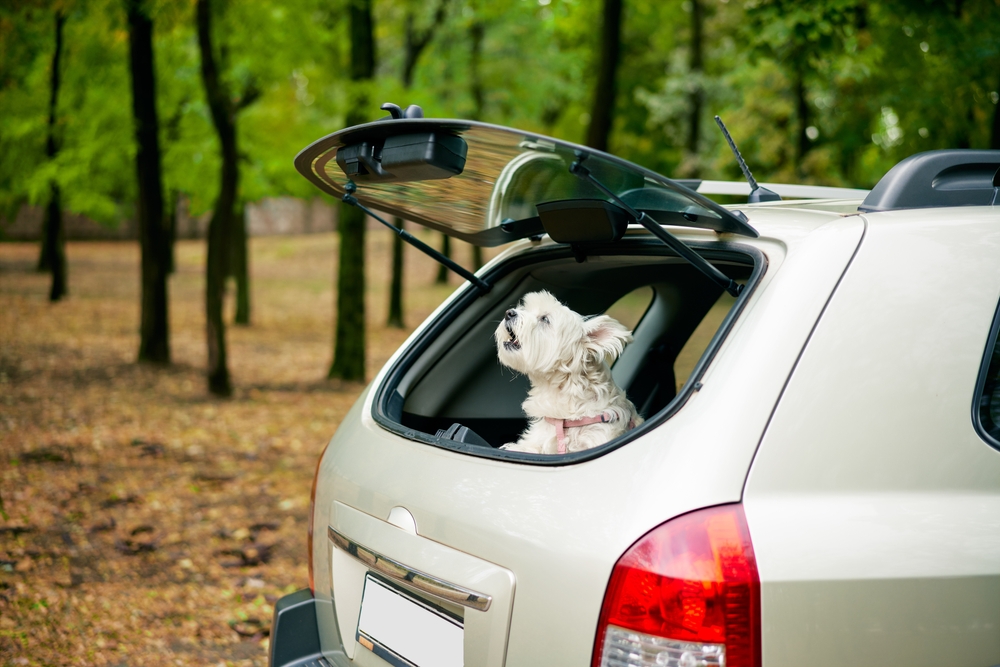
What Are the Signs of Car Sickness?
The signs of motion sickness can appear at any time as you’re driving. While vomiting and diarrhea are the most obvious indicators, additional signs of physical discomfort can include:
- Licking the lips
- Yawning
- Panting
- Excessive drooling
- Whining and circling
Stress-related signs of car sickness may appear before your dog even gets in the car. Since the experience of being nauseated is stressful enough, your dog may eventually create a negative association with the vehicle and become anxious once they realize they have to get in.
You may notice your dog get panicky and experience an increase in heart rate, breathing, drooling, and trembling. In extreme cases, dogs with travel-related problems can lash out aggressively at their owners if they try to force them into the vehicle.
Your vet is a great resource for learning more about traveling safely with your dog, managing stressful car rides, or easing car sickness.
If you need to speak with a vet but can't get to one, head over to PangoVet. It's an online service where you can talk to a vet online and get the personalized advice you need for your pet — all at an affordable price!

What Are the Causes of Car Sickness?
Around 10%–16% of dogs experience motion sickness, with young and developing dogs being the most susceptible. Nausea related to motion sickness occurs through the part of the brain that controls balance: the vestibular system. When vision and other senses don’t line up with the motion the body is experiencing, it results in dizziness and nausea.
The vestibular system consists of several areas in the brain, the middle ear, and the nerve pathways running between them. The receptors in the middle ear detect rotational and linear acceleration, helping the dog stay oriented. Since these inner ear components aren’t fully developed in puppies, a sense of imbalance and subsequent nausea while riding in a car are common.
Conflict Between Sight and Balance
A dog’s vision and balance are the two critical factors when traveling in a vehicle. Typically, they work together to give them a sense of bodily awareness, whether they’re moving or at rest. But if they disagree, such as when your dog’s vision indicates they aren’t moving but their vestibular system says they are, motion sickness can set in.
Inner Ear Diseases
Inner ear disease can have many causes, including trauma, tumors, or infections. Dogs lose their sense of balance with this condition, resulting in car sickness even with a developed vestibular system. It can also lead to nausea outside the car too.
Dogs with drooping, heavy ears are more susceptible to trapping moisture, wax, and debris that can lead to an infection. A reduced sense of balance often accompanies an ear discharge, odor, and visible facial issues. Dogs with inner ear infections require immediate veterinary attention and will regain their balance within a few weeks if the condition is addressed early.
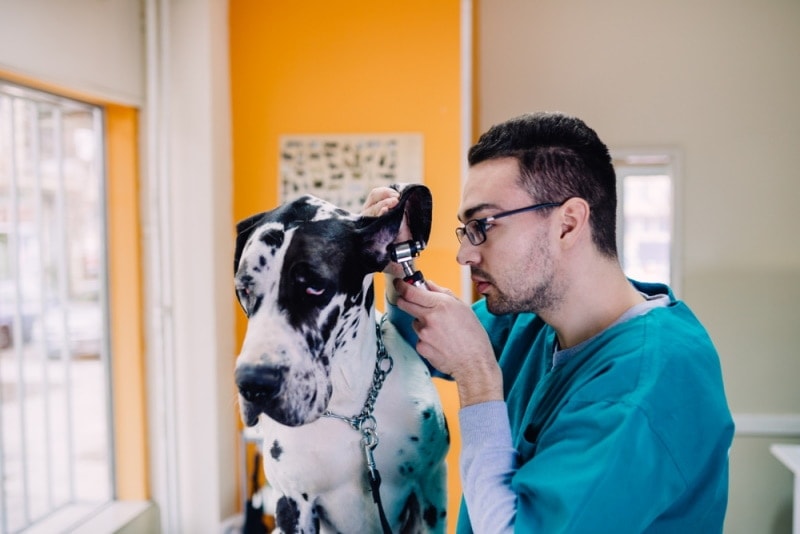
Stress
Car sickness isn’t always related to motion and its physiological effects on your dog. Stress can also cause physical illness. If your dog has created a negative association with being in the car, the mental anxiety they feel can eventually transition to physical signs.
Maybe they’re stressed about the destination, knowing they’re on the way to the vet or a boarding facility, which is common if they don’t go to many other places. Or perhaps they had motion sickness as a puppy due to their immature vestibular system, and the experience has made them uneasy about getting in the car as an adult.

How Do I Care for a Dog With Car Sickness?
Car sickness can either arise from motion sickness or emotional and mental stress. While dealing with the former is often a waiting game as your dog develops physically, you can take steps to help your dog grow comfortable with being in the car if their sickness is anxiety-related.
As with many other stressful stimuli, desensitization and counterconditioning can help your dog change their perception of the car and their response to it. Rather than force your dog into the vehicle, you want to show them that it can be safe and rewarding. It’s best to begin desensitizing and conditioning your dog as soon as you notice signs of car sickness.
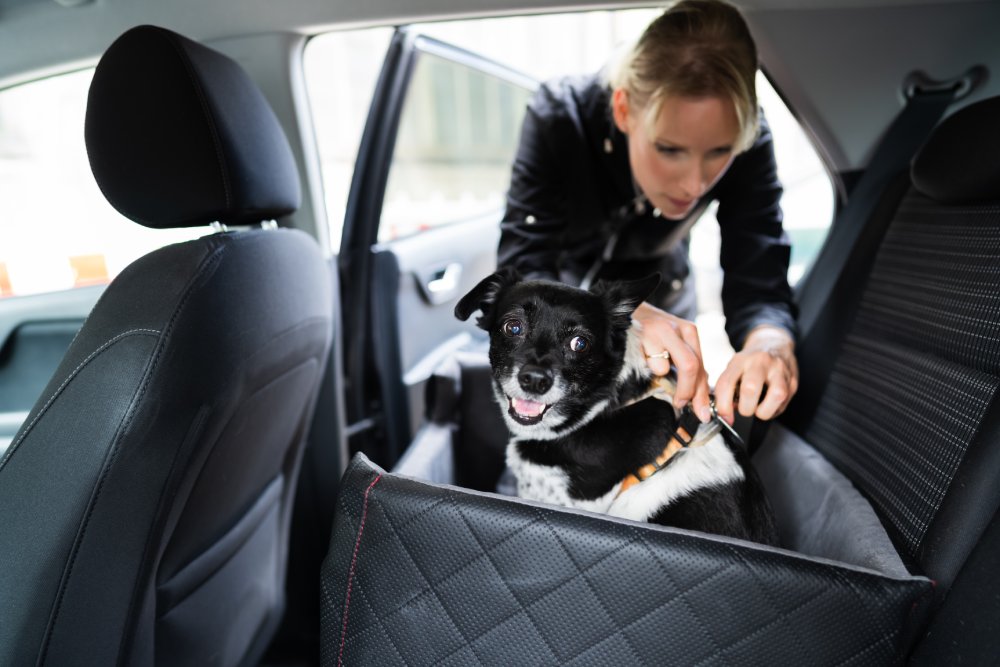
How to Desensitize and Counter Condition Your Carsick Dog
Start slowly to build your pet’s tolerance for the car. Have them sit in it with the engine off, praising and rewarding them for their calm behavior. Once they’re comfortable, you can start the car and have them sit while the engine runs. Eventually, you can take your dog on short drives, ideally starting at lower speeds.
Never progress faster than your dog can handle. Focus on success, and take a step back if your dog gets sick. Travel-related sickness can take several months for dogs to overcome, so stay patient and positive.
Once your dog is comfortable moving, take them on rides beyond the strictly necessary trips. Take them to dog parks, play dates, and other fun activities. Your dog will gain more experience being in the car on different routes, letting them view it as more than a simple precursor to the groomer or vet.
How to Prevent Car Sickness in Puppies & Dogs
A car ride is often as stressful for your dog as you choose to make it. While you can’t control every aspect of the environment, the following are a few ways to improve your pet’s experience and reduce the chances of car sickness:
- Avoid feeding your dog for at least 2 hours before the car trip.
- Give your dog a sense of security by putting them in a carrier or safety harness.
- Open the windows slightly to equalize the pressure and cool the interior.
- Offer a chew toy or special “car only” toy to relax and distract your dog.
- Maintain a cool, quiet car interior.
- Face your dog forward and block their side views.
- Add soothing scents using familiar items from home or calming pheromone products, such as Adaptil Travel.
Your vet can suggest specific remedies to resolve your dog’s unique issues. Depending on the source of their car sickness, they may prescribe anti-nausea medications, antihistamines, or sedatives to calm their nerves.
Several natural herbal supplements, including lavender and ginger, also have supposed calming benefits. Always discuss natural or over-the-counter medicines for your dog’s car sickness with your vet before adding them to your pet’s regimen.
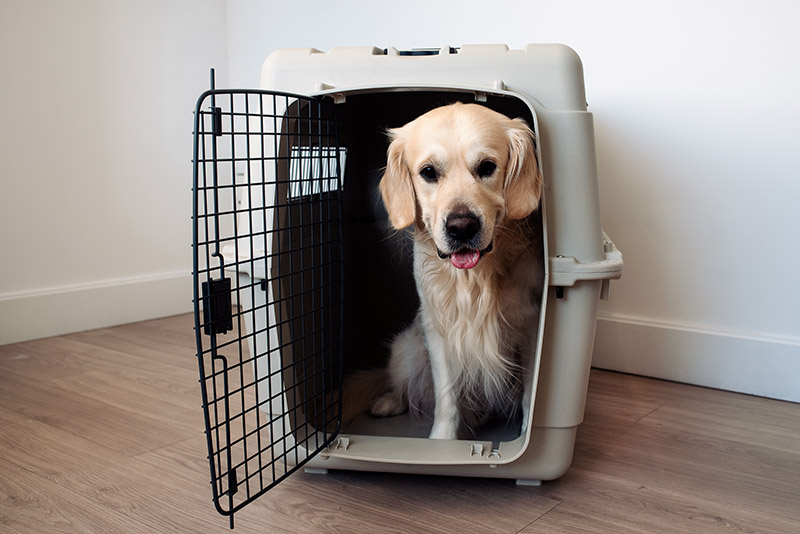

Frequently Asked Questions (FAQ)
When Do Puppies Outgrow Car Sickness?
Growing puppies usually get over their vestibular issues at around 6 months, though larger dogs may take longer. Generally, dogs lose their susceptibility to motion sickness within their first year.
When Should I Introduce My Puppy to Car Rides?
Riding in a car is no different than socializing and training: the earlier you start, the more natural it is when your dog is an adult. Dogs that frequently travel in cars as puppies tend to have fewer issues with stress and car sickness when they grow up.
You can introduce your dog to short drives and the various car noises when they’re young, and these will make the ride as smooth as possible when it’s time for a long journey.

Conclusion
Car sickness in dogs is part physical and part psychological; it’s an issue that will only worsen until you take action. Fortunately, you can take several simple steps today to change your dog’s perspective and ease their stress. Follow these tips, and talk to your vet about improving the experience to keep your dog excited for every road trip.
Featured Image Credit: Monika Wisniewska, Shutterstock
















